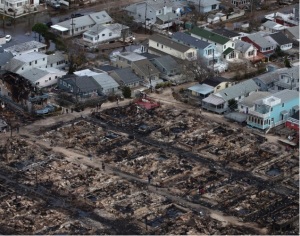Images from hurricane Sandy are in and they are heartbreaking. Our Northern brothers and sisters have been hit hard. Homes destroyed. Unimaginable loss. Desperation. It is during these times that we feel helpless asking, “What can I do?”
We empathize with those who have lost everything and those working hard to restore the area. We understand that compensation from insurance companies will come, but may not cover all the damage. That is why many churches and schools are hosting food drives, delivering water, food, batteries and love-filled hugs. The Red Cross is boots-on-the- ground as are our military and regular everyday folk who just want to help. For those who can give financially, please do so either to the Red Cross, architectureforhumanity.org or Because We Care Ministries who arrived in New Jersey days ago. I mention these three charities because I personally know people who work there and because there have been reports of people with less than noble intentions are already taking advantage of folk. C’mon now. Let’s work together.
Today I write asking my fellow authors and readers to participate in a book drive. Realizing that times are tight and some people can not write a check; I urge authors, book reviewers, and readers to give what they already have . . . copies of books. Plenty of helpers will rebuild neighborhoods, but who will help the libraries? Prior to this storm, libraries had already experienced deep cuts; they were doing more than ever with limited resources. That is why I need your help.
If you are an author, please help me send copies of your work to Sandy victims. If you are a reader or book reviewer and have books in PRISTINE condition, you can help also. I am one woman on a mission to give books to those in need. This little project is not a quick fix. Yes, I realize that people need homes, but they will also need books. I figure if students can send coats, authors and readers can send books. If we all do what we can then every little bit will help. This book drive is my “little bit.” My hope is that every person reading this post will send at least one book. Wouldn’t that be wonderful?
When I mentioned this idea to local booksellers and my NYT author friends, I quickly realized that southern authors and readers were ready to ship tons of books to our friends up North. I have collaborated with George Eberhart, Editor of American Libraries Magazine who kindly helped me locate libraries in need of assistance. If you are inclined to help please send me your information and I will forward the mailing address of the library that is in need. If you’re an author, or library staff, my goal is to build a relationship that benefits readers.
For Librarians and Media Specialists along the coast: North Carolina, New Jersey, Long Island, Delaware. If Sandy damaged your library and you would like to add books to your permanent collection, please contact me using the address below.
Authors, readers, and book reviewers: Please follow the instructions and include all information requested to add your title to the list.
Add your name to the list using the contact information below.
Please email me at: Reneawrites(at)gmail(dot)com.
PLEASE, DO NOT SHIP BOOKS TO ME! Contact me through the above email.
Authors, please include the title, ISBN, CIP, Genre, URL link and, of course, contact information. Readers and reviewers, I just need contact your information.
From my heart to yours, thank you. Remember, every book counts.
 Renea Winchester is the award-winning author of In the Garden with Billy: Lessons about Life, Love & Tomatoes. In 2012, she was named the Atlanta Pen Women Author of the Year. She is passionate about literacy. When she isn’t writing, she shelves books at the public library. She is currently seeking representation for her third book In the Kitchen with Billy: Farming, Friends & Fried Bologna Sandwiches, and her first novel currently in progress. Visit her at www.reneawinchester.com. To learn about Pen Women in your area click here.
Renea Winchester is the award-winning author of In the Garden with Billy: Lessons about Life, Love & Tomatoes. In 2012, she was named the Atlanta Pen Women Author of the Year. She is passionate about literacy. When she isn’t writing, she shelves books at the public library. She is currently seeking representation for her third book In the Kitchen with Billy: Farming, Friends & Fried Bologna Sandwiches, and her first novel currently in progress. Visit her at www.reneawinchester.com. To learn about Pen Women in your area click here.
Filed under: Current Events, Helping Victims | Tagged: Architect for humanity, Atlanta Pen Women, Because We Care Ministry, East Coast Hurricane Damage, http://www.nlapw.org/, Hurricane Sandy, Long Island, National League of American Pen Women, New Jersey, New Jersey Library, North Carolina, Queens Library, renea winchester, Superstorm Sandy, writing | 4 Comments »









